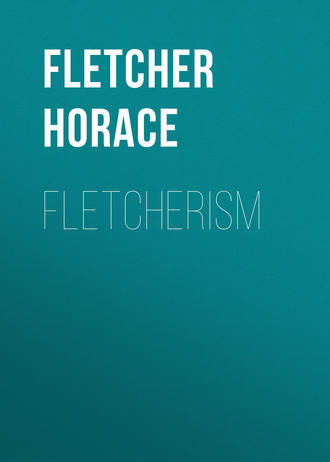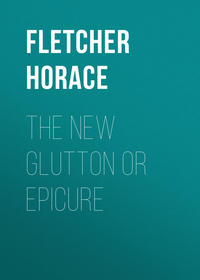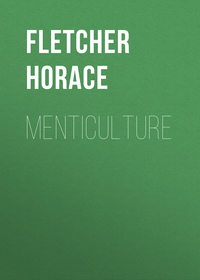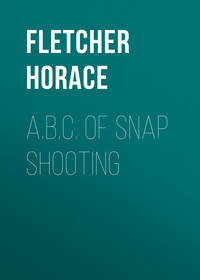 полная версия
полная версияFletcherism
To ascertain Nature's requirements of preferences it is necessary to begin with the first essentials of care, the nutrition of the body and the management of the mind. These basic essentials are the first concern of Fletcherism and really the crux of the Scientific Management of the Highest Efficiency.
One of the most important discoveries in the development of Fletcherism is the fact that
MUSCLES HAVE MEMORIESThe usefulness of this discovery rests in the knowledge that it is possible to make the muscles connected with nutrition commit to memory the sequences of procedure in the processes of nutrition which accomplish the most profitable results, and then pass on to other details of responsibility care-free and thought-free, fully confident that everything will go on as Nature would have it go.
Without beginning this discipline of the muscular equipment at the right point and in the right manner, no solid structure of Efficiency-Building can be secured. Any amount of indigestion, or unnecessary strain put upon metabolism, interferes with the smooth working of the organism in the same way that an infinitesimal weight put at the tip end of the long arm of a lever multiplies the burden of resistance at the short end many, many fold.
Therefore, the Crux of Fletcherism is found in first training the muscular and mental apparatus to proceed with thorough deliberation relative to every thing taken into the body; for from this intake, and especially from the manner of the handling of this material along the line of the alimentary canal, come efficiency or inefficiency.
It is first necessary to know what you want the muscles to habituate themselves to doing in connection with nutrition. They must learn to know what constitutes a true appetite, in contradistinction to indefiniteness of want or desire. The muscles will soon learn to know that real hunger (body need) is not expressed by any uncomfortable feelings below the guillotine line. Only in the head, where the senses are all bunched together for the most important team-work, is honest hunger sensed. We may rightly add to the list of the senses, Appetite, and trust it with confidence to tell us what the body can use to advantage of the foods available at the time. That the foods are appetizing is the only recommendation necessary to a set of muscles trained to treat them as Nature requires when they enter the laboratory of the mouth.
Connected with the training of the mouth-muscle outfit, there is the one standing order. Challenge everything applying for entrance, whether by special invitation or in the way of surprise, by testing it for taste-acceptability at the tip of the tongue. Then keep on tasting and testing, with reverential appreciation of the gustatory delight there is in it, in the full knowledge that both digestion and assimilation, which are the prime necessities of nutrition, are healthfully stimulated by accentuated enjoyment.
It is not necessary to dwell intensively on sensual enjoyment of the material being automatically handled by the methodical muscles. The pleasant sense sensations surrounding taste may serve as an accompaniment to agreeable conversation, to the delight of beauty in any form, to flowers, to music, to graceful and vivacious femininity, or to any sort of charm, with added strength given to the effect on wholesome nutrition.
So much for the usefulness of the mouth-muscles, including that most wonderful of muscles, the tongue, in assisting in the healthful stimulation of nutrition. Their most important office is to stand guard against the contingencies that are liable to happen which are prejudicial to digestion. If there is worry in the atmosphere: "Don't let anything into the mouth on pain of court-martial and suffering!" Those are the "orders of the day" for the sentinel muscles of the mouth, serving at the outer entrance of the alimentary canal.
In the category of "worry" are included anger, argument, blues, or any other of the depressant passions, and no food or drink, other than water, should be admitted to the canal while any form of depressants are being suffered.
We must agree in the first place that it can do no harm to wait for a clearance of the mental atmosphere. Real hunger is not a painful craving for something or anything, but is a most accommodating waiter for final collection of all the taste dividends there are due in a big lump sum to compensate for not getting them by instalments. Consequently, if the mental atmospheric conditions are not favourable to the best nutrition, the best way to clear them is to wait. Nothing is so forceful in making one modify or forget passing clouds of pain or disappointment as growing healthy Hunger.
The mouth-muscles soon learn to know this beautiful provision of Mother Nature, whereby deferred collections by appetite are paid with compound interest sometimes sure, if by the waiting process the mental atmosphere is cleared of the elements of digestive lightning and thunder.
How delightful it is to be assured that the best way to secure the best nutrition is the easiest way and that it can be quickly installed as a habit, so that attention to the mechanics of the care is not necessary, leaving the whole battery of appreciation to employ itself with the gustatory festival.
CHAPTER XV
FLETCHERISM AND VEGETARIANISMThe Danger of Excess of Protein – The Use of Meat and Uric Acid – To Sum Up – Profitable Economy
In the warfare against the "Demons of Dietetic Disturbances" most of the volunteer recruits go into the camp of the Mealers, that is, they become vegetarians, quasi-vegetarians, or partial vegetarians, and array themselves against human carnivorous habits and practices. They are comparatively few in numbers, but make up in enthusiasm what they lack in numerical strength. Some of them base their objection to meat-eating on physiological grounds, others on sentimental susceptibility, and yet others are influenced by reasons of economy.
With world-wide and centuries-old evidence before me in forming an opinion, I say without hesitation that the weight of argument is in favour of a meatless diet most, if not all, of the time, and that all who subsist on the first-hand fruits of the soil and do not resort to cannibalism, except in cases of emergency, are on the safer side.
THE DANGER OF EXCESS OF PROTEINTo mention the greatest danger from using meat for nutrition first, we find it almost impossible to eat most meats without taking into the organism more protein (nitrogen) than is required for repair of the broken-down tissues; and we now know that any excess of protein or nitrogen imposed upon the body is not good for it. Large excess is positively deadly in its final effects, and many, if not all of the so-called uric-acid troubles or diseases are traced to such abuse.
Not only are the kidneys worn out long before their time, but high blood-pressure is one of the baleful results that lead to untimely demise. To be sure, persons are reported to have lived to near or quite an hundred years of age as habitual meaters, but their occupations or activities have been favourable to burning up the dregs of metabolism, and the belief is reasonable that if they had not been thus self-abusing during the first century of their life they might have gone quite a piece into the second century with their matured experience, example, and wisdom, serving the world to good advantage.
THE USE OF MEATThat meat is an emergency expedient in the natural nutrition of man is pretty certain. Strictly speaking, we are all of us subsisting on meat all of the time, but it is only one degree removed from the vegetable kingdom, when we ingest only the first fruits of the soil, as vegetarians do, and make meat of it within us. The vegetable nutriment is transformed into our own flesh and blood in the form of fat chiefly, and then is used to furnish whatever heat and repair material we happen to need. When second-hand, already dead and decomposing meat is eaten and thus used for life-giving purposes, it is really not only second-hand supply but third-hand material. For instance, we may subsist exclusively on vegetable or farinaceous material and get our repair or fuel supply from such sources only. The result is, in part, the forming of the walls of our own stomach. These walls are meat. Should we turn into cannibals, devouring each other as the Pacific (?) Islanders used to treat missionaries and enemies, the stomach walls become tripe and are easily digestible. While they were live walls, holding in place glands secreting powerful gastric juice, they resisted the digestive aggression of their own juice, but the moment they were separated from their own living combination, quite similar gastric juice digested them as quickly as it does the white meat of a pet chicken. It is physiologically possible to cut out a part or the whole of our own stomach, and then devour and digest it as tripe in the small intestines.
Hence it is that we are all meaters, perforce, but not all of us are third-degree-removed cannibals. What we call "pure vegetarians" are only second-hand meaters.
I am indebted to the distinguished champion tennis-player, diet-reformer, and restaurator Eustace Miles, for the name "Meaters" to designate those who eat meat; and I have coined the term "Mealers" to stand for those who take only first-hand earth-fruit products for their nutrition, disregarding the fact that all are mealers who take meals of victuals. To offset this addition to the vocabulary, it would do no harm to drop off the use of "Meals" and "Victuals," leaving "Meal" to mean only one thing; viz., ground cereals or vegetables.16
One of the details of carefulness in Fletcherism is expressed in the statement that we should not proscribe as food anything that Nature permits to be utilized as food; but the same carefulness prescribes that we do not prescribe it as food for everybody all of the time. Everything in its proper time and place is one of the common-sense rules of the system.
Captain Amundsen and his comrades, as I have already observed, were quite justified in devouring their faithful and friendly sledge dogs when necessary to preserve their own lives. I have the acquaintance of a collie dog whom I love devotedly; and I say "whom" appropriately because he is as intelligent as I am, and far more consistent in his habits of orderliness and naturalness. He is a real gentleman at all times and as good a Fletcherite when the food substance and occasion demand as I am. He has learned to eat and enjoy apples and no one could give more careful mouth-treatment to some sorts of food than Bruce. I am sure that he would want me to eat him if I needed him to preserve my life, just as unselfishly as the Japanese soldiers, and more recently the Balkanese soldiers, gave their lives for their causes. Whether I would eat him or not I cannot say, and I do not know if he would have similar consideration or otherwise for me.
I merely use this illustration as an aside in consideration of the question of flesh eating on emergency or sentimental grounds. Nature permits Bruce and me to eat each other, and if we managed it skilfully we could attack each other's extremities at the same time, as long as we did not encroach on our vital machinery, and really eat each other up, as young lovers would like to do.
Thus much for sentiment. We are subsisting on ourselves all of the time; we can nourish ourselves at the expense of each other if we will.
We can eat human flesh as nourishingly as we can a Spring chicken, and if we do not know what we are eating, Nature will say us never "No," but there are other considerations more practical for every-day consideration. These are: physiological and economic expediency.
MEAT AND URIC ACIDIn the thorough investigation that Dr. Hindhede, of Copenhagen, has conducted for the past few years, and in which I have assisted, I have followed the quest with eagerness because of the thoroughness of it. It has been proven that very little protein or nitrogen is needed for the human body even under strain of hardest physical or mental activity. On the other hand, it has been found that any appreciable excess of protein or nitrogen results in both uric acid secretion and increased blood-pressure, meaning, in all probability, finally fatal strain on the organism. It has also been demonstrated that it is almost impossible to take the leaner meats without getting more protein or nitrogen than the body needs.
It is quite easy to get excessive protein and nitrogen from vegetable, farinaceous, and hen-fruit material, and cheeses are richer than anything in these "strong" food ingredients; but these are not such subtle foolers of the appetite as meats done up in spicy gravies and accompanied by appetising fats.
I purposely avoid giving any figures relative to the food values under mention because the first rule of Fletcherism in connection with the selection and intake of food is to leave that entirely to appetite, working intelligently and normally in relation to the food that is available at the moment.
To my thinking, the most important consideration is economy, not alone of the money cost of food, but economy of energy-consumption within the body. There may be times when economy of money-cost means much to persons struggling to lay aside an independent competency for the purchase of leisure in old age, or for insurance against becoming a burden upon others; and this is sure to happen to all who are not cursed by the handicap of money inheritance. But it is the internal economy of the body that counts for most in estimating values. There is no doubt but what flesh food is a stimulant of the same or similar character of alcohol. Both of these subtle agents of intemperance invite the starting and accumulation of vicious cycles or circles (swirls) of over-stimulation that have one bad effect, at least, on the comfort and efficiency of the muscular tissues. They facilitate fatigue and "that tired feeling," and also may result in contingent "soreness" of muscle after unusual exercise.
Faithful Fletcherizing has resulted in regulating these matters in a way that is nothing less than marvellous until the reasons are revealed.
Not only does observance of the habit and practice which Mr. Rockefeller has condensed into thirty-three words, including several repetitions for emphasis, result in settling the questions of appropriateness, economy, emergencies, and comfort in general between the Meaters and the Mealers; between the mixed Meaters and Mealers; and between the Physiology and Psychology of normality; and which Mr. Rockefeller calls "Fletcherizing," but a whole lot of beneficent cycles or circles (rhythms) of profitable felicities are set in motion.
TO SUM UPThe Mealers have the advantage of the argument in that they are always on the safer side of prudence, and there is no real deprivation involved in the experiment.
At the present moment I am, personally, still in the experimental field as regards everything that Nature permits as food or drink. There is one point that vegetarianism has not satisfactorily answered as yet. The great majority of conscientious vegetarians have not the pink complexion that is usually reckoned as a sign of beauty or robustness, but I have known one, Frederick Madsen (Madsen the Faithful), an assistant of Dr. Hindhede in Copenhagen, to subsist on potatoes and butter, or margarine, alone, for three hundred days consecutively, stopping only because the potatoes to be had in the market were not as good as desired, and he lost none of his pinky-pinkness of complexion of the richest Scandinavian brilliancy. I have done the same for four months with similar results of retention of pinkness of complexion. Another question is: Does pinkness indicate health? It is not the necessity of health among Latins and bronzed Orientals, but it underlies the bronze exterior in even African Negroes, if they are healthy. Sallow is the reverse of healthy in proportion to the sallowness, as a usual thing.
Just here is where the efficacy of careful eating, which has been formulated as Fletcherism, comes into service most agreeably to make life really worth living and actually one continuous festival of usefulness and pleasure. It is only once formed into a habit and set to working automatically under the direction of Appetite, Taste, Feeling, Instinct, and the other attributes of sub-conscious Intelligence.
It will be noted that Mr. Rockefeller, in his recent pithy, gisty utterance relative to the merits of Fletcherizing, makes no mention of the kind of food to be recommended. Happily, as far as I know, he is not in the food business, has no connection with any special food supply, and cannot recommend any of the products of petroleum as food or drink. He should be absolutely unprejudiced in his judgment, and seven or eight years of recuperative experience, similar to mine of a longer period, is material for judgment and recommendation.
Some years ago there was born in me the ambition to formulate the rules of economic procedure in securing optimum nutrition in a space of not more than ten pages of coarse print that mothers, teachers, and children of primary school age could understand as easy as the noses on their faces. Mr. Rockefeller has "beat me out" in brevity by several lengths. He has made the revelation with the lucky number of thirty-three words, and left room for a final remark full of scriptural tone, as is his wont.
PROFITABLE ECONOMYThere is one argument in favour of a meatless diet that appeals to everybody, and that is the economy and cleanliness of it. In Professor Irving Fisher's classic investigation to test the merits of Fletcherism it was proven that careful attention to the mastication, insalivation, and enjoyment of food while in the mouth, and swallowing only in response to a strong invitation to swallow, and removing from the mouth whatever remainder that did not practically swallow itself, a net gain of approximately 40 per cent. was achieved without any attempt at economy. The saving was in the money cost alone, and it came from more and more inclination towards farinaceous and vegetable foods and away from more expensive meat.
This form of saving is very telling. Dr. Francis E. Clark, founder and permanent president of the great International Christian Endeavour organization, noticed a reduction of one-third in the food expenses of his family. The health officer of a suburb of Hamburg accomplished a saving of two thousand marks a year in his family of three without other assistance than careful eating and an inclination towards non-flesh food material. The "Poor White Trash" community in America, before mentioned, saved an average of three dollars a month each, three thousand dollars a month among a thousand members of the community, and the missionary workers who taught them to Fletcherize save half of the cost of their sustenance. Accompanying all of this wonderful economy was an immunity from the ordinary illnesses that was worth more than the money saving.
In the Rockefeller family any decrease in the cost of food is a negligible quantity in comparison with the total expenses, but seven years of immunity from indigestion and replacing the demon with good golf-health form have been worth more than millions of money.
APPENDIX
WAS LUIGI CORNARO RIGHT?>A PAPER READ BEFORE THE PHYSIOLOGICAL SECTION OF THE BRITISH MEDICAL ASSOCIATION, AUGUST, 1901, BY ERNEST VAN SOMERENMr. President and Gentlemen:
Being a general practitioner, it is with some trepidation and an apology that I present myself before this section. The reasons for my doing so are: First, that I believe that a hitherto unsuspected reflex in deglutition has come to light which has an important bearing on health, the prevention of disease and on metabolism. Second, that any theory whatever, based on a possible physiological function, claiming to diminish, as this does, the amount of sickness and suffering now existent, should have serious investigation. Third, that I desire to enlist your skilled help in the consideration of the theories I have doubtless crudely erected on my premise.
According to the "Encyclopædia Britannica," "Luigi Cornaro (1467-1566) was a Venetian nobleman, famous for his treatises on a temperate life. From some dishonesty on the part of his relatives, he was deprived of his rank and induced to retire to Padua, where he acquired the experience in regard to food and regimen which he has detailed in his work. In his youth he lived freely, but after a severe illness at the age of forty, he began under medical advice gradually to reduce his diet. For some time he restricted himself to a daily allowance of 12 ozs. of solid food and 14 ozs. of wine. Later in life he still farther reduced his bill of fare, and he found that he could support his life and strength with no more solid meat than an egg a day. So much habituated did he become to this simple diet that when he was about seventy years of age the addition, by way of experiment, of 2 ozs. a day had nearly proved fatal. At the age of eighty-three he wrote his treatise on the 'Sure and Certain Method of Attaining a Long and Healthful Life.' And this work was followed by three others on the same subject, composed at the ages of eighty-six, ninety-one, and ninety-five, respectively. 'They are written,' says Addison ('Spectator,' No. 195), 'with such a spirit of cheerfulness, religion, and good sense, as are the natural concomitants of temperance, and sobriety.' He died at the age of ninety-eight." Some say of 103!
Now, was Luigi Cornaro right? Did he make use of a physiological process unknown to us of the value of which he was not cognisant? To live to an advanced age, must we be as temperate as he, reducing the quantity of our food to a minimum required by Nature?
That we all eat more than we can assimilate is unquestionable. How can we determine the right quantity? Instinct should guide us, but an abnormal appetite often leads us astray. Nature's plans are perfect if her laws are obeyed. Disease follows disobedience. Wherein do we disobey?
We live not upon what we eat, but upon what we digest; then why should undigested food, recognisable as such, be deemed a normal constituent of our solid egesta?
Something like the following must be a common experience to general practitioners, especially to those practising on the Continent. The patient comes to see us and volunteers the information that he or she has the "gout," "rheumatic gout," or "dyspepsia." Symptoms are asked for. The case is gone into carefully for causation. An appropriate diet and an appropriate bottle of medicine prescribed. As the patient leaves the room, we may, or may not, call attention to the fact that both teeth and saliva are meant to be used. The patient returns, better, in statu quo, or worse. If better, he remains so while under treatment, and relapses when he returns to ordinary habits. If unaffected, or worse, we try again and again, until we despair, then take or send him to a consultant. Temporary benefit, possibly owing to renewed hope, results; but finally the unfortunate gets used to his sufferings, and, if he can afford it, is sent to join the innumerable hosts that wander from one Bad to another, all Europe over, trying, praising, and damning each in turn. Their manner of living is, of course, at fault. Nature never intended that man should be perpetually on a special diet and hugging a bottle of medicine, nor did she ordain that he should go wandering over the map of Europe drinking purgative and other waters.
Though early yet to speak with certain voice, it would seem that we are provided with a Guard, reliance on which protects us from the results of mal-nutrition. There seems to be placed in the fauces and the back of the mouth a Monitor to warn us what we ought to swallow and when we ought to swallow it. The good offices of this Monitor we have suppressed by habits of too rapid eating, acquired in infancy or youth.
Last November my attention was called by Mr. Horace Fletcher, an American author living in Venice, to the discovery in himself of a curious inability to swallow, and a closing of the throat against food, unless it had been completely masticated. My informant stated that he noticed this peculiarity after he had begun to excessively insalivate his food, both liquid and solid, until all its original taste had been removed from it. Any tasteless residue in the mouth, being refused by the fauces, required a forced muscular effort to swallow. He further told me that since adopting this method of eating he had been cured of two maladies, adjudged chronic, the suffering from which rendered him ineligible for Life Insurance. His weight now became reduced from 205 lbs. to 165 lbs. He had practised no abstemiousness, had indulged his appetite, both as to selection and to quantity, without restraint, and for the last three years had enjoyed perfect health.







